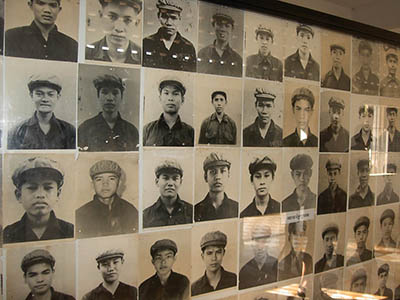Former Research Fellow Kosal Path Publishes Article on Cambodian Genocide Perpetrators

 Photos of young Khmer Rouge fighters at the Tuol Sleng museum
Photos of young Khmer Rouge fighters at the Tuol Sleng museumIn “The Lingering Effects of Thought Reform: The Khmer Rouge S-21 Prison Personnel,” Path and co-author Angeliki Andrea Kanavou study how young men plucked from rural Cambodia were turned into obedient arbiters of genocide by the Khmer Rouge regime. They focus on the staff who ran the infamous Tuol Sleng prison, where 12,272 to 20,000 people were jailed, tortured and murdered from 1975-79.
Through interviews with former S-21 personnel in the Extraordinary Chambers of the Courts of Cambodia (ECCC), Path and Kanavou found that young men were recruited to work at the prison precisely because they were poor, uneducated, and therefore believed to be more easily indoctrinated into the KR regime.
When they were first recruited, cadres would undergo intense “thought reform,” whereby their “ill habits and intentions” were uprooted through interrogation “study meetings” and self-criticism sessions that would last for 12 hours a day. They were taught to be vigilant not only of their prisoners, but of themselves and their coworkers, and to eliminate any behavior that went against the revolution.
A major factor in their obedience, Path and Kanavou argue, was Cambodia’s societal norms and cultural traditions that favored respect, hierarchy, Buddhist rituals and revenge. Cambodians were urged to renounce the individual self and property and practice self-scrutiny. They had also been brought up to be suspicious of the “other” – non-party members, those perceived to be capitalists, anarchists or imperialists – and were indoctrinated to be willing to do anything to rid society of such deviance.
Former S-21 personnel said that they were so terrified of their commanding officers that they didn’t dare to speak out or refuse when they were ordered to kill or torture prisoners, and they also genuinely wanted the approval of their superiors. They knew that if they were found to be traitors, their whole family would be killed as well. This is also consistent with Cambodian traditions of “a head for an eye,” or disproportionate revenge in the face of dishonor, and the need to publicly save face and prove themselves.
Path and Kanavou close their article by discussing the long-term effects this “thought reform” may have had on the cadres. They quote several former S-21 personnel who seem to still believe that they needed to be “reformed” and don’t want to blame their superiors for the crimes committed at Tuol Sleng. The former cadres also seem able to dissociate from the tortures they carried out, instead emphasizing that they felt they had no choice and did not think about the consequences of their actions much.
Like this article? Get our e-newsletter.
Be the first to learn about new articles and personal stories like the one you've just read.